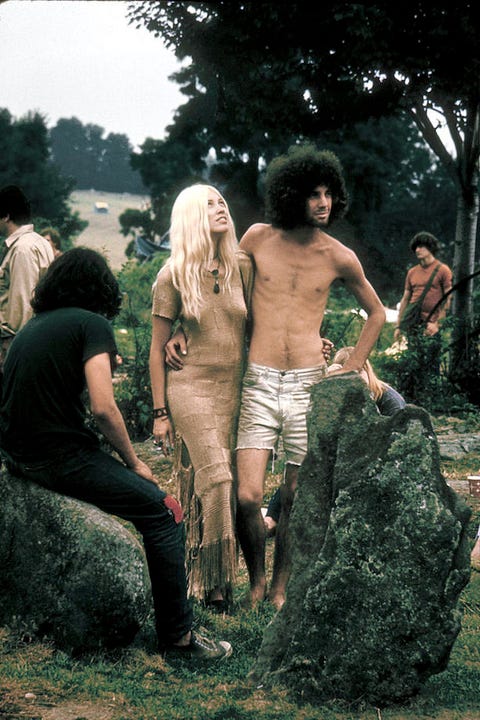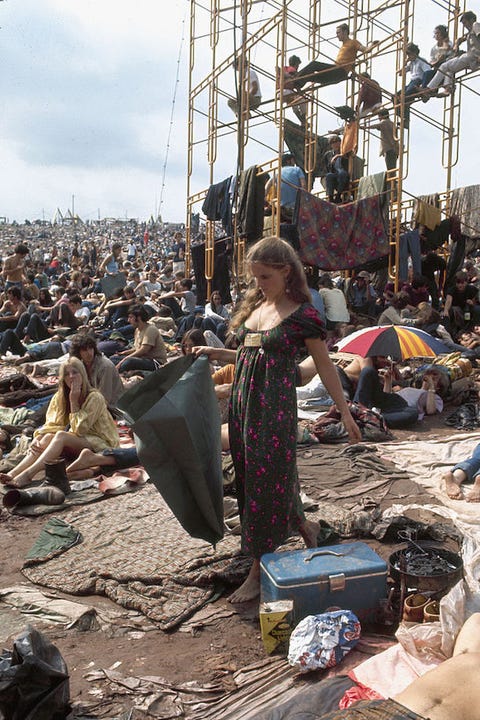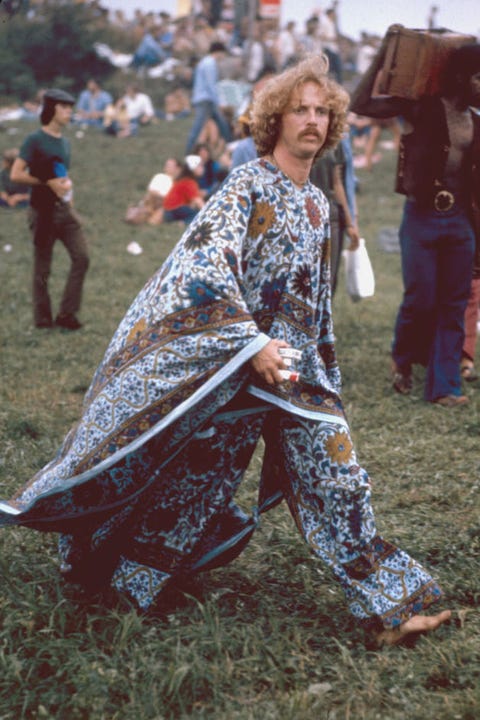It is no surprise that fashion has long been considered a mirror to our reality. It reflects our current collective social consciousness when it comes to mental health, spending habits, politics, and morality– often heightened during chaotic times as a means to escape.
The industry is often broken down into bite-size, consumable eras for our nostalgic joy. The '20s brought about flapper dresses and short hair while the '90s led to the emergence of the ultra-glamourous supermodel in a world of luxury and excess. Whether it's the '60s and '70s hippie years or slightly-too-big padded shoulders and crimped hair of the '80s, each fashion decade can be eclipsed by various illegal substances.
The prohibition era led to formless silhouettes and shorter hemlines that allowed for movement to party all night long. The '80s and '90s, often thought of America's cocaine-fueled years, all mirrored the stimulant with on-the-go pre-athlesiure materials like velour, spandex, and lycra forming jazzercise-appropriate garments.
The most formative years of the relationship between style and stimulants are the '60s and '70s. In the shadow of post-war America, the then-youth, now Baby Boomers began to experiment with substances, pop culture, and fashion. Primarily, cannabis, LSD, and flower power clothing.
LSD, or lysergic acid diethylamide, is a psychoactive hallucinogen invented by Swiss scientist Albert Hoffman. On April 19, 1943, Hoffman went on the world's first recreational trip and rode home on his bicycle, for science, of course. His discovery of LSD's effects cemented the drug as one with extraordinary potency, capable of causing significant shifts of consciousness in incredibly low doses. The day became known as bicycle day to LSD enthusiasts and slowly began to trickle into the mainstream as a popular drug of choice.
The years after the discovery of the drug were clouded in scientific research, with LSD being used by medical professionals to attempt to treat ailments like post-traumatic stress disorder or depression. In the 1960s, Harvard psychologist Timothy Leary encouraged America's youth “turn on, tune in, and drop out," speaking highly of the drug and its power to elevate consciousness, leading students to turn to LSD to protest the current political environment.
Also known as acid, the hallucinogenic drug influenced some of the most important artistry of its time. The Beatles' Revolver and Sgt. Pepper's Lonely Hearts Club Band albums were shaped by the members' experimentation with LSD, while colorful paper tabs of the substance were littered on the tongues of nearly everyone at the first Woodstock arts and music festival in 1969. LSD didn't just touch music, though Its impact on the societal standards of dressing and overhauling restrictive fashion norms was far more pivotal.
The mid-to-late '60s and '70s it-fashion can be defined as fluid and loud, from bright, organic prints to flowing, carefree silhouettes. In contrast with the fashion of earlier decades, most notably mod style, psychedelic, and funk clothing primarily relied on garments from other cultures. It wasn't uncommon to find embroidered Peruvian ponchos and luxurious Indian kaftans during the "Summer of Love," in 1969.
European couturiers like Pierre Cardin, Emilio Pucci, and André Courrèges experimented with short mini skirts, color-blocking styles, and shift dresses, adding to an already liberated female form. Across the pond in the United States, counterculture youth often rocked bohemian kaftans, floral embellished tops, and bold headscarves and wraps at music festivals. During everyday wear, both men and women alike wore wide pants that allowed for greater movement and tie-dye tops, perhaps inspired by a particularly pleasant acid trip.
The flower power generation's shift towards an open mind and united consciousness after experimenting with LSD didn't just appear within their lifetimes. Like all cyclical fashion trends, the influence of acid far outlived the hippies. Young designers, the Boomer's children, were no doubt inspired by the nostalgic twinge old photo albums and music provided. On the runways. LSD influenced some of fashion's most avant-garde minds, then and now. The late '80s and early '90s creatives emerging on the scene were the first wave to come after: Dries Van Noten, Anna Sui, and Cher favorite, Bob Mackie.
While each designer varies in their structure, fluid prints and patterns often adorn collections from their work, whether back in the day or modern. Experimentation, whether it be with deep-cut V-necks or kaleidoscopic patterns, the hypnotic tidal wave continues to alter the clothing we see today.
In Gen Z fashion, fashion's largest group of rising consumers has jumped on the psychedelic bandwagon as well. Thrifted clothing off shopping app, Depop has allowed today's youth to experiment with the '60s and '70s silhouettes. Last year's cottagecore trend is also an ode to the flowing fabrics of the decade, with cap sleeves and puffy blouses making a comeback reminiscent of Woodstock '69. In printed matters, sustainably sourced clothing from designers like Paloma Wool has focused on colors, fusing burnt oranges and lime greens to create a trippy canvas.
This content is imported from Instagram. You may be able to find the same content in another format, or you may be able to find more information, at their web site.
As we head into the two most wonderfully chaotic days of the year, it's important to remember the roots of the fashion and substances that shape our modern pop culture. So put on Tame Impala, grab your oversized DIY tie-dye hoodie from earlier this quarantine, and venture into Lucy's Sky Full of Diamonds.
"lasting" - Google News
April 21, 2021 at 02:34AM
https://ift.tt/3dzbHdW
Psychedelics' Long Lasting Impact On Fashion – CR Fashion Book - CR Fashion Book
"lasting" - Google News
https://ift.tt/2tpNDpA
Shoes Man Tutorial
Pos News Update
Meme Update
Korean Entertainment News
Japan News Update
Bagikan Berita Ini

























0 Response to "Psychedelics' Long Lasting Impact On Fashion – CR Fashion Book - CR Fashion Book"
Post a Comment